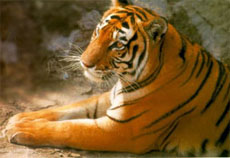| About China > Fauna & Flora > Class I Animals > Mammalia |
|
|
Tiger
With the alias of Old
Tiger (in Chinese), it belongs to the Felidae family of Carnivora order. Its
scientific name is Panthera tigris (Latin), or Tiger
(English).
It is the largest catamount existing in China. Its body length is 140 to 280 centimeters, and the tail length is 60 to 90 centimeters. The male Northeast Tiger weighs 180 to 306 kilograms, and the female weighs 90 to 120 kilograms; the male South China Tiger weighs 149.6 to 225 kilograms, and the female weighs 90 to 120 kilograms. Its huge body has round head, stout four limbs, and sturdy physique. Its forepaw has long and acuminate claw, which can shrink. Its ear is short and round, and black on the back of the ears, with a white spot. The upper half of its hair is jacinth, russet or orange yellow. Its body and four limbs have a series of black narrow cross-striation. Some regions are double cut. Its belly is white, and the black lines are distinct. Black lines of the tail are arranged in a horizontal way, and the point of the tail is black.
It inhabits in various types of forests. Except in the periods of oestrus, mating and fostering babies, it mostly leads a solitary life. It mainly moves about at night, preying on animals of 10 to 100 kilograms, or some 160 to 400 kilograms sambars and buffalos. In a typical case, Tiger can eat 17 to 27 kilograms of meat each time, and the larger tiger can eat 35 kilograms of meat in every meal. Tiger mainly preys mammals with relatively large body, especially ungulate, but also preys small animals such as bird, crawl, fish, frog, crab, and locust.
Its oestrus is mostly in January to February. Its gestation period lasts 90 to 105 days, with one fetus every 1 to 2 years and 1 to 6 babies per fetus, but usually with 2 to 3 babies. The new-born tiger weighs 500 to 600 grams. About 10 days later, it can open its eyes. The suckling period is about 3 months. After following the tigress for 18 to 24 months, young tiger will move about alone. It grows to sexual maturity at the age of 3. Under breeding condition, it has a lifespan of up to 23 years.
It is distributed in the regions of Northeast, East China and South China, with the existing quantity of less than 100 heads. In the regions of Qinling Mountains and south of the Yangtze River, the quantity is much smaller.
Tiger has been listed in Appendix I of International Trade Convention on Endangered Wild Animal and Plant Species. |
||||
 |
